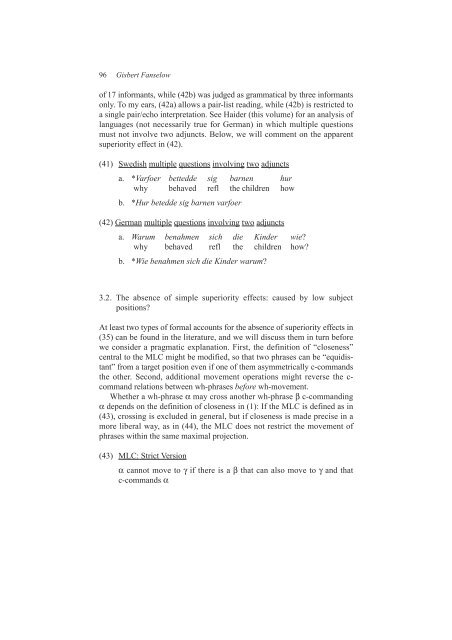Minimality Effects in Syntax · The MLC and Derivational Economy ...
Minimality Effects in Syntax · The MLC and Derivational Economy ...
Minimality Effects in Syntax · The MLC and Derivational Economy ...
Create successful ePaper yourself
Turn your PDF publications into a flip-book with our unique Google optimized e-Paper software.
96 Gisbert Fanselow<br />
of 17 <strong>in</strong>formants, while (42b) was judged as grammatical by three <strong>in</strong>formants<br />
only. To my ears, (42a) allows a pair-list read<strong>in</strong>g, while (42b) is restricted to<br />
a s<strong>in</strong>gle pair/echo <strong>in</strong>terpretation. See Haider (this volume) for an analysis of<br />
languages (not necessarily true for German) <strong>in</strong> which multiple questions<br />
must not <strong>in</strong>volve two adjuncts. Below, we will comment on the apparent<br />
superiority effect <strong>in</strong> (42).<br />
(41) Swedish multiple questions <strong>in</strong>volv<strong>in</strong>g two adjuncts<br />
a.*Varfoer bettedde sig barnen hur<br />
why behaved refl the children how<br />
b. *Hur betedde sig barnen varfoer<br />
(42) German multiple questions <strong>in</strong>volv<strong>in</strong>g two adjuncts<br />
a. Warum benahmen sich die K<strong>in</strong>der wie?<br />
why behaved refl the children how?<br />
b.*Wie benahmen sich die K<strong>in</strong>der warum?<br />
3.2. <strong>The</strong> absence of simple superiority effects: caused by low subject<br />
positions?<br />
At least two types of formal accounts for the absence of superiority effects <strong>in</strong><br />
(35) can be found <strong>in</strong> the literature, <strong>and</strong> we will discuss them <strong>in</strong> turn before<br />
we consider a pragmatic explanation. First, the def<strong>in</strong>ition of “closeness”<br />
central to the <strong>MLC</strong> might be modified, so that two phrases can be “equidistant”<br />
from a target position even if one of them asymmetrically c-comm<strong>and</strong>s<br />
the other. Second, additional movement operations might reverse the ccomm<strong>and</strong><br />
relations between wh-phrases before wh-movement.<br />
Whether a wh-phrase α may cross another wh-phrase β c-comm<strong>and</strong><strong>in</strong>g<br />
α depends on the def<strong>in</strong>ition of closeness <strong>in</strong> (1): If the <strong>MLC</strong> is def<strong>in</strong>ed as <strong>in</strong><br />
(43), cross<strong>in</strong>g is excluded <strong>in</strong> general, but if closeness is made precise <strong>in</strong> a<br />
more liberal way, as <strong>in</strong> (44), the <strong>MLC</strong> does not restrict the movement of<br />
phrases with<strong>in</strong> the same maximal projection.<br />
(43) <strong>MLC</strong>: Strict Version<br />
α cannot move to γ if there is a β that can also move to γ <strong>and</strong> that<br />
c-comm<strong>and</strong>s α
















